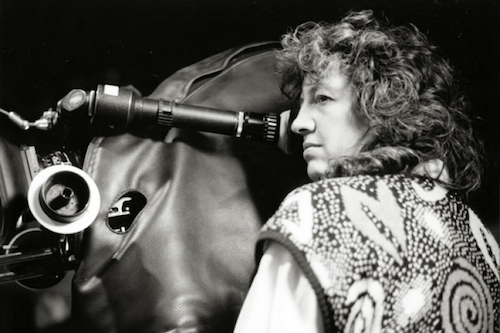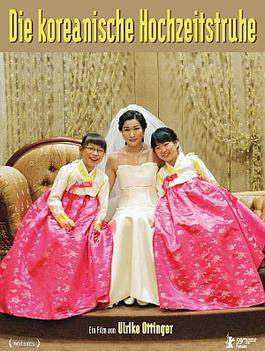독일 뉴웨이브 거장 울리케 오팅거 감독 회고전@메트로그라프(3/14-21)
독일 뉴웨이브 영화의 거장 울리케 오팅거(Ulrike Ottinger, 77) 감독의 회고전이 3월 14일부터 21일까지 맨해튼 로어이스트사이드 인디 영화관 메트로그라프(Metrograph, 7 Ludlow St.)에서 열린다. 울리케 오팅거 감독은 한국에서 촬영한 다큐멘터리 '서울 여성 행복(Seoul Women Happiness, 2008)'과 '코리안 웨딩 체스트(Die Koreanische Hochzeitstruhe/ The Korean Wedding Chest, 2009)'를 연출한 바 있다. 오팅거 감독은 2020 베를린영화제에서 Berlinale Camera를 수상했다. 오팅거 감독은 '코리안 웨딩 체스트' 상영회(3/14, 3:30pm)에 참석해서 영화를 소개할 예정이다. 이번 회고전은 캘리포니아주 버클리(BAMPFA)와 LA 레드캣(REDCAT)로 순회 상영된다.
A Retrospective of the German New Wave Master and 2020 Berlinale Honoree Ulrike Ottinger with Ottinger In-Person!

Retrospective Will Travel to Berkeley, CA (BAMPFA) and Los Angeles (REDCAT)
“One of the crucial modern filmmakers... For Ottinger, the play of imagination is an essential realm of freedom, a way for women to defy and liberate themselves from the misogyny that’s embedded as deeply in consensus styles as in consensus politics." – Richard Brody, The New Yorker
"Her cinema is restless, Odyssean: full of stories of exile and adventure." – Amy Sherlock, Frieze
Beginning Saturday March 14 (and continuing throughout the year), Metrograph will present a comprehensive retrospective of Ulrike Ottinger, who will appear in-person during opening weekend. Since her move to Berlin in 1973, German director Ottinger has been a flamboyant one-woman revolt against the cinematic status quo. One of the most consequential filmmakers in the New German Cinema, Ottinger produced hyper-stylized subversive epics, among the most adventurous and addictive movies of the last 50 years. Switching between documentary and fiction and drawing heavily from mythological, religious, and modernist texts, Ottinger has built a laugh-out-loud funny, gender-expansive, ultra-intelligent body of work that earns her a spot in film history alongside Agnès Varda, Lina Wertmüller, Jane Campion, and Chantal Akerman. With new DCP restorations and archival 16mm and 35mm prints.
Exile Shanghai (1997/275 mins/DCP)
Ottinger’s funny, fascinating film evokes a lost world: the Jewish community in 1930s Shanghai, who found in the port city, which didn’t require a visa, a refuge from persecution in Europe. Exploring the city in search of former synagogues and other meeting places and interviewing surviving former members of the expatriate community, many of whom moved onward to California, Ottinger’s sprawling mosaic film conjures up the memory of an expat Berlin on the Huangpu River, and of the city of Shanghai itself prior to the enormous changes that would follow war and revolution.
Freak Orlando (1981/126 mins/DCP)
An outrageous, carnivalesque camp reading of Virginia Woolf’s Orlando, Ottinger’s crazed comedy follows its gender nonconforming hero/heroine through five wide-ranging adventures that span the history of the world: the Freak City department store, medieval times, the Spanish Inquisition, the circus sideshow, and then off on a European tour. With avant-garde star Magdalena Montezuma brilliant in the shapeshifting central role, close collaborator Delphine Seyrig as Orlando’s female opposite number (with Jackie Raynal her Siamese twin), and cinema’s greatest transgender Jesus.
Saturday, March 14 - 5:30pm - Intro/Q&A with Ottinger
The Image of Dorian Grey in the Yellow Press (1984/150 mins/DCP)
In Ottinger’s contemporary reinvention of the famous morality tale, fin-de-siècle dandy Dorian Gray is reimagined as a drag role, played—without comment on the switch—by Veruschka von Lehndorff in the male lead. Ottinger collides Oscar Wilde with Fritz Lang, featuring Delphine Seyrig as one “Dr. Mabuse,” the head of a sinister multinational newspaper agency that conspires to create Gray, to control him, and to destroy him. An odyssey through eye-popping tableaux, including a trip to an unforgettable underworld.
Sunday, March 15 - 1:15pm - Q&A with Ottinger

Joan of Arc of Mongolia (1989/165 mins/DCP)
Delphine Seyrig’s high-society anthropologist is traveling the Trans-Siberian railroad with a bevy of eccentric international passengers: Fassbinder favorite Irm Hermann’s Teuton school teacher, a starry-eyed young female backpacker, a Broadway star (Gillian Scalici), an all-female klezmer trio, and Micky Katz’s famed Yiddish tenor. They’re halted in the steppes by a detachment of Mongolian tribe women who take the female passengers captive. A brawny epic, a camp musical, and “a sumptuously stylized yet ardently observational film that builds its wild contrasts into its plot.”— The New Yorker
Sunday, March 15 - 7:15pm - Q&A with Ottinger

The Korean Wedding Chest (2009/82 mins/DCP)
Ottinger’s unorthodox fairy tale ethnography, commissioned by the Women’s Film Festival in Seoul, travels to that city in order to explore the phenomenon of the South Korean wedding chest, filled with symbolic items, and the rituals that accompany it. In the course of the journey, we discover an ultramodern East Asian megacity where ancient tradition and myth exist side by side with contemporary capitalist enterprise. “I was inspired to look more closely at the old and new rituals to determine what is old in the new and new in the old.”— Ulrike Ottinger
Saturday, March 14 - 3:30pm - introduction by Ottinger
Madame X: An Absolute Ruler (Ottinger/Tabea Blumenschein/1978/147 mins/DCP)
The hard, merciless pirate ruler of the China Sea, Madame X sends out a missive to women, inviting them to leave domestic security behind for a life of dangerous adventure, but when a panoply of different women—including Yvonne Rainer on roller skates—arrive to serve as her shipmates, they find themselves slaves to a new tyrannical power. In her first feature, Ottinger is already inimitable, making use of extravagant costumes courtesy Tabea Blumenschein and a languid style that’s all her own.
Sunday, March 15 - 3:45pm - Q&A with Ottinger
Prater (2007/105 mins/35mm)
An anecdotal cultural history of the storied Viennese pleasure garden, whose amusement park, the oldest in the world, provided the scene of the wheel ride in Carol Reed’s The Third Man (1949). Ottinger’s beguiling and visually alluring film explores the shifting nature of technological attractions and the Prater’s life in cinema and newsreels, while introducing us to the garden’s visitors. Images of actress Veruschka wandering the grounds in Barbarella costume show Ottinger’s surrealist sensibility very much intact, while she connects the Prater’s heyday to that of the freakshow and the fairground cinema of attractions.
Ticket of No Return (1979/108 mins/35mm)
Ottinger’s collision of Hollywood flamboyance and a particularly dour documentary aesthetic suits this Janus-faced tale of two female lushes from two very different walks of life, alike in many ways, but incapable of recognizing their bond. One is a known bag lady barfly; the other a socialite oddball who stays aloof from her surroundings, quietly but intently suiciding with booze. Their paired stories play out in a Berlin peopled by punks and New German Cinema icons, including Nina Hagen, Tabea Blumenschein, Magdalena Montezuma, and Eddie Constantine.
Saturday, March 14 - 8:45pm - Intro by Ottinger







